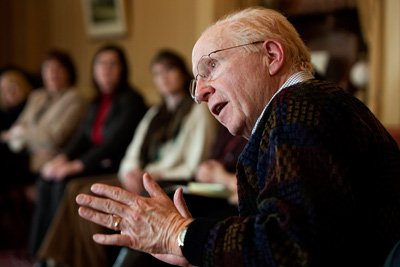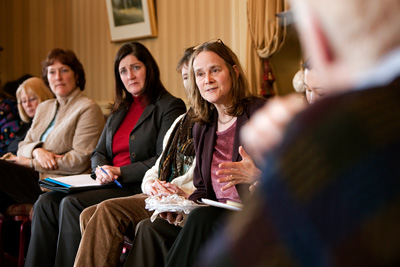'Evolving' strategic plan to emphasize Cornell's whole, not its parts
By Anne Ju


Encapsulating Cornell's major goals for the next five years into a single document means taking a broad look at its most pressing priorities -- all the while seeing the university not as a scattered set of colleges, but as a whole.
That was a point of emphasis by Edward Lawler, chairman of the Strategic Planning Advisory Council, and Provost Kent Fuchs during a March 3 brown-bag lunch meant to encourage informal discussion on the ongoing strategic planning effort. The event was hosted by Lawler, an ILR School professor, and Fuchs, who together co-chair the strategic planning process.
"We assume that the fundamental strengths of Cornell -- the academic strengths -- are in the colleges and programs," Lawler said. "But we also assume that Cornell is more than the sum of its parts, and we focus on that greater sum in this report."
To the 25 or so attendees, Lawler explained that the eight-faculty-member council hopes to have a second draft document available publicly by March 15. The draft has "evolved" since the process started, he said, most notably by addressing such themes as the singularity of Cornell rather than the individual colleges; setting faculty excellence as a high priority in the face of anticipated retirements; focusing on diversity and inclusion; and pushing Cornell's global presence.
Though the planning process is set in an environment of economic challenge, it is not meant to be limited by that, Fuchs said.
"It is one of the few things we are doing that looks beyond our current challenges, and really looks to the future," Fuchs said.
Todd Miner, executive director of Cornell Outdoor Education, questioned whether enough emphasis was being placed on the importance of staff to the university's excellence.
"The academic mission is the core of what we do, but I think there is a lot of learning that goes on outside the classroom, and I would love to see it somehow reflected here," Miner said.
Cayenna Ponchione, public services assistant at the Music Library, also had questions about staffing. She said that while Cornell's staff is shrinking, the strategic plan includes specific goals about hiring new faculty and even "pre-filling" positions -- that is, hiring ahead of anticipated retirements.
She pointed out that retaining new faculty would be difficult without adequate staff support, and "the research element is going to suffer."
The strategic plan's working groups did have staff representation, and it's true that neither staff nor students sit on the advisory council, Lawler said. He said the draft includes a section on staff excellence, and the upcoming draft improves upon the principles conveyed on the role of staff.
David Lewis, professor of city and regional planning, asked Fuchs and Lawler how the strategic plan would ultimately differentiate Cornell from peer institutions. Lawler said the integration of Cornell's public outreach mission with its academic strengths is a crucial point, and the plan might therefore involve "recasting" the land-grant mission and how it relates to the education of students.
The strategic plan is one of three parts of the "Reimagining Cornell" effort; the others are the Initiatives Coordination Office and the academic task forces. After a review by the board of trustees in April, the strategic planning council aims to have a completed document sometime in May.
Get Cornell news delivered right to your inbox.
Subscribe